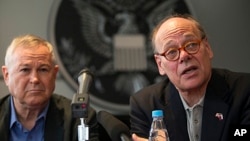MOSCOW —
After a week-long visit in Russia, U.S. lawmakers say they have found no glaring misstep by American intelligence that allowed the Boston marathon bombings to go undetected.
The six-member delegation came to Moscow on a mission to determine what, if anything, could have been done to prevent the attacks that killed three people and wounded hundreds more in Boston on April 15.
California Republican Dana Rohrabacher, chairman of the House Foreign Affairs Subcommittee on Europe, Eurasia and Emerging Threats, led the delegation.
"We have been asked a number of times - do we believe that the Boston marathon massacre could have been thwarted. And, the answer is there is nothing specific that could've been done that we can point to that, had it been done differently, would have prevented this," said Rohrabacher.
The delegation had high-level security meetings with Russia's Federal Security Service (FSB), formerly known as the KGB. Democrat William Keating from Massachusetts says he was shown a copy of a letter that was sent to the Federal Bureau of Investigation (FBI), by the FSB, in March of 2011 that had detailed information about bombing suspect Tamerlan Tsarnaev.
Keating said the letter included Tsarnaev's date of birth, address, his cell phone number and his mother's Skype number, among other things. Keating says Russian intelligence officials believe the bombings could have been averted, if the United States had done more with the information they were given from Moscow.
Rohrabacher admits that better cooperation between the former Cold War foes may have prevented the tragedy.
"We can say that had we had a much higher level of cooperation all along, so that the whole situation would have been different, I believe that would have been one of the types of things we could have thwarted by higher level of cooperation between our two countries," he said.
The FSB has consistently said it has provided accurate information to the FBI and the Central Intelligence Agency (CIA) about the Boston bombing suspects. Washington has maintained that some of the information they were given included inaccurate spellings of the suspects' names.
Ironically, Russian President Vladimir Putin told reporters that, unfortunately, Moscow did not have pertinent information on the Tsarnaev family, and that to the Kremlin's misfortune, the FSB could not have given Washington detailed information.
Meanwhile, both Moscow and Washington have pledged better counter-terrorism cooperation.
The six-member delegation came to Moscow on a mission to determine what, if anything, could have been done to prevent the attacks that killed three people and wounded hundreds more in Boston on April 15.
California Republican Dana Rohrabacher, chairman of the House Foreign Affairs Subcommittee on Europe, Eurasia and Emerging Threats, led the delegation.
"We have been asked a number of times - do we believe that the Boston marathon massacre could have been thwarted. And, the answer is there is nothing specific that could've been done that we can point to that, had it been done differently, would have prevented this," said Rohrabacher.
The delegation had high-level security meetings with Russia's Federal Security Service (FSB), formerly known as the KGB. Democrat William Keating from Massachusetts says he was shown a copy of a letter that was sent to the Federal Bureau of Investigation (FBI), by the FSB, in March of 2011 that had detailed information about bombing suspect Tamerlan Tsarnaev.
Keating said the letter included Tsarnaev's date of birth, address, his cell phone number and his mother's Skype number, among other things. Keating says Russian intelligence officials believe the bombings could have been averted, if the United States had done more with the information they were given from Moscow.
Rohrabacher admits that better cooperation between the former Cold War foes may have prevented the tragedy.
"We can say that had we had a much higher level of cooperation all along, so that the whole situation would have been different, I believe that would have been one of the types of things we could have thwarted by higher level of cooperation between our two countries," he said.
The FSB has consistently said it has provided accurate information to the FBI and the Central Intelligence Agency (CIA) about the Boston bombing suspects. Washington has maintained that some of the information they were given included inaccurate spellings of the suspects' names.
Ironically, Russian President Vladimir Putin told reporters that, unfortunately, Moscow did not have pertinent information on the Tsarnaev family, and that to the Kremlin's misfortune, the FSB could not have given Washington detailed information.
Meanwhile, both Moscow and Washington have pledged better counter-terrorism cooperation.




